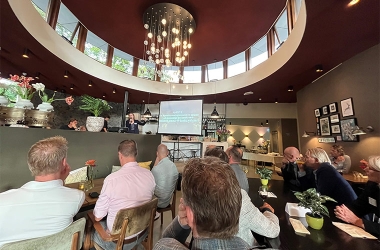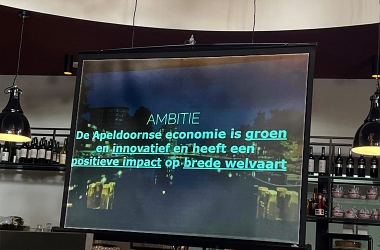Apeldoorn Charts its Economic Course for 2040 with Insight from Wittenborg
Apeldoorn Charts its Economic Course for 2040 with Insight from Wittenborg
Apeldoorn Charts its Economic Course for 2040 with Insight from Wittenborg

Wittenborg Joins Apeldoorn's Vision for 2040
On 13 September, the municipality of Apeldoorn made significant progress in charting its economic course during the 'Werkatelier Economische Koers 2040'. Maggie Feng, CEO of Wittenborg, joined over sixty stakeholders, including entrepreneurs, employers, businesses, educational institutions and community organisations, in actively shaping the city's trajectory.
Themes of 'green' and 'innovation'
Their vision includes creating an environment with a thriving business climate, attracting companies and institutions and providing abundant opportunities for learning and growth.
The workshop was divided into two sessions, featuring insightful talks by speakers Ruben Nieuwenhuis, Ruben Zondervan and Cees-Jan Pen. Topics ranged from start-ups, technology and innovative collaboration concepts to the transition towards a new energy-based economy. These sessions paved the way for in-depth discussions on the themes of 'green' and 'innovation'.
In the green economy context, participants emphasised sustainability and future-proof innovations. They called for visible demonstrations of Apeldoorn's commitment to environmentally friendly practices within its business locations.
The second session focused on the spatial economy, highlighting the importance of aligning businesses with suitable spaces. Business clusters, craftsmanship and circular industries emerged as critical components of Apeldoorn's economic landscape.
Five pillars of Apeldoorn's Economy
The discussions covered the five pillars of Apeldoorn's Economic Course: space for work, business climate, job market, attractive city and economic innovation. Participants stressed the significance of selecting businesses with added value, sustainable aspirations and a positive impact. They underscored the importance of preserving existing economic activities and fostering innovation-friendly environments through collaboration within the Stedendriehoek Region.
Stakeholders expressed their willingness to invest more in energy-neutral and climate-adaptive areas under specific conditions. Renovating outdated sites, such as Herzbergerparc, facilitating vertical intensification within zoning plans and accommodating small-scale businesses in locations like Zwitsal and Nettenfabriek, were identified as priority areas.
Apeldoorn's entrepreneurs
The workshop also provided valuable insights into the experiences and needs of Apeldoorn's entrepreneurs. While satisfaction with entrepreneurial services varied across sectors, regions, and business sizes, participants highlighted the importance of clear, transparent, and unobstructed regulations. They called for a reduction in obstructive rules, less micromanagement and greater pragmatism.
Participants acknowledged the broader interests served by the government, including well-being, debt relief and the creation of an attractive city for employees. They emphasised the need for physical space to expand and grow businesses, with a focus on supporting local enterprises and the broader SME sector.
Connecting entrepreneurs locally and regionally was identified as an essential role for the municipality. This involves fostering networks and investments to bridge the gap between entrepreneurs and educational institutions, promoting collaboration and knowledge exchange.
Calling all students
Furthermore, participants highlighted the importance of involving youth, students and young employees in these discussions to ensure the city's future success.
The workshop also addressed Apeldoorn's image, recognising its unique combination of safety and urban amenities. While considered a green city, Apeldoorn faces the challenge of an outdated image. Participants called for initiatives to rejuvenate the city and surrounding areas, making them more appealing to young families, youth and students. Affordable housing and improved public transportation options were cited as essential components of this revitalisation effort.
Lastly, the workshop underscored the importance of a well-qualified workforce for a sustainable, secure and healthy society. Participants emphasised strengthening the connection between education and the job market through practical assignments and a specific focus on technical skills. They also recognised the contributions of the hospitality and leisure sector to the city's attractiveness.

Wittenborg's role in the city's future
Feng acknowledged the significant role educational institutions like Wittenborg play in guiding Apeldoorn towards a brighter future.
"It is important to help the region to sail in the right direction so that prosperity of the city and the region is maintained and increased in this changing world where climate change, globalisation, technology transformation and demographic development are key factors that no one can ignore."
Feng said that this contribution to the region's workforce development is essential and should be a central point in all discussions related to the city's future.
WUP 12/10/2023
by Erene Roux
©WUAS Press
695 words